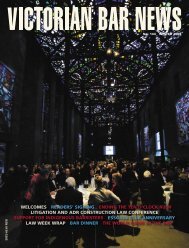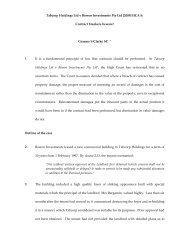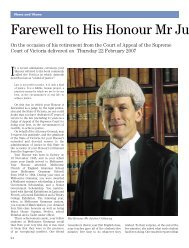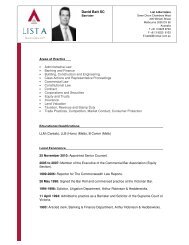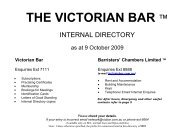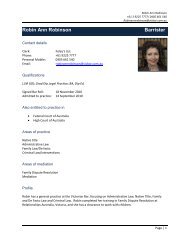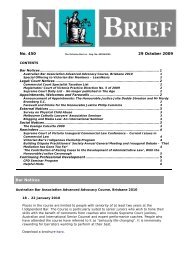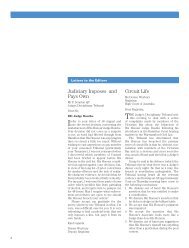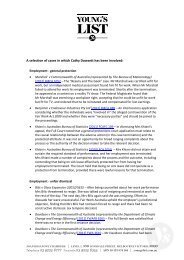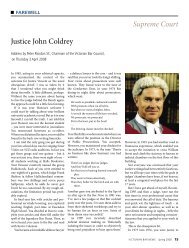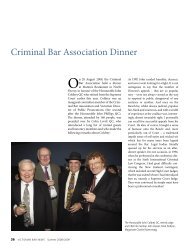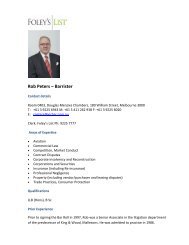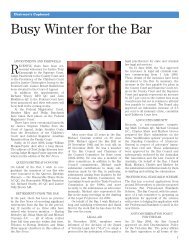News and ViewsProtecting Rights in aClimate of FearThe following speech was delivered by Julian Burnside QC on 13 December2006 as the Equal Opportunity Commission’s Sixth Annual Oration.IN a climate of fear, protection ofhuman rights becomes extraordinarilydifficult. It brings to the forefront thetension between the majoritarian principleof democratic rule and the humanitarianprinciple of protecting the powerlessand marginalised. In that setting, protectionof human rights presents its greatestchallenges.The maintenance of civil libertiesdepends on the delicate balancebetween the government’s authority andits self-restraint. That balance will becompromised if any of three conditionsare satisfied. The first is when the politicalopposition is either weak or absent.The second is when the press is weak orcompliant. And the third is when the lifeof the nation is at risk from civil disturbanceor external threat (whether real orimagined). The first two conditions haveexisted in Australia in varying degreesfor a decade. The third was delivered onSeptember 11, 2001.The terrorist attack on the UnitedStates was shocking. It transfixed theworld as the Twin Towers exploded andcollapsed in a giant cloud. The nightmareimage of the second plane finding its targetmay be the defining image of this newcentury.The response of western governmentsto September 11 might be the definingcharacteristic of the twenty-first century.Adequate protection of human rightsdepends on a number of things. First,Parliament must exercise restraint in legislatingwhere human rights are affected.They should recognize that human rightsare a basic assumption in democraticsystems, and that majoritarian rule doesnot justify the mistreatment of unpopularminorities.In the wake of September 11, ASIO’spowers have been greatly increased. Theynow have power to hold a person incommunicadofor a week, and force them toanswer questions on pain of five years’ jail.70Julian Burnside QC.The person need not be suspected of anyoffence.The Federal Police now have powerto obtain a secret order jailing a personfor up to a fortnight, without a trial andwithout the person having committed anyoffence. They can obtain a secret controlorder, placing a person under house arrestfor up to 12 months without access to telephoneor internet. In each case, the personaffected by the order is not allowedto know the evidence against them.These laws betray the most fundamentalassumptions of a democratic society.The protection of human rights alsodepends on the executive showingrestraint and decency in administeringlaws which have the potential toaffect human rights. In this, the HowardGovernment has a miserable record, arecord made all the worse by their hypocriticalmaundering about “family values”and a “fair go”.The idea of a fair go was nowhere tobe seen when Mr Ruddock instructed theDepartment of Immigration to argue thecase of Al Kateb. Mr Al Kateb had arrivedin Australia seeking asylum. He was heldin immigration detention. He was refuseda protection visa. He asked to be removedfrom Australia, because he found theWoomera detention centre unbearable.Unfortunately, he could not be removedbecause he is stateless — there is nocountry in the world to which he could bereturned. The Migration Act provides thata person who comes to Australia withouta visa must be detained and must remainin detention until they get a visa or untilthey are removed from Australia. This isthe mandatory detention regime. Peopleheld in detention have not committedany offence: they are held in high securityjails because an Act of Parliament ordersit.What of Mr Al Kateb? They refusedhim a visa, but could not remove himfrom Australia. The “fair go” HowardGovernment argued that Mr Al Katebcould be held in detention for the rest ofhis life if necessary. That argument wasfound by the High Court to be legally correctand constitutionally valid.It is deeply shocking that any governmentin a western democracy is preparedto argue for the right to jail a person forlife without trial, and without suspicionof any offence. If nothing else about theHoward Government is remembered, let italways be remembered that they arguedfor the right to jail an innocent person forlife.Family values cannot be reconciledwith the indefinite detention of refugeefamilies in conditions which drive childrento attempt suicide.ASIO has vast powers and seeks, whereverpossible, to avoid any scrutiny of itsactivity by Courts. Mahommad Sagar hasbeen held on Nauru by Australia for fiveyears, even though Australian officialsaccept that he is a refugee. He has beenadversely assessed by ASIO, and they
efuse to tell him why. They argue thatthey should not have to reveal to him— or to anyone — what facts they tookinto account in deciding to assess himadversely. Although ASIO refuse to tellany other government why they haveadversely assessed Mohammad Sagar,Sweden has agreed to receive him. Theirdecision is an eloquent recognition of boththe cruelty and the stupidity of Australia’sposition.The protection of human rights alsodepends on the public remaining awareof the importance of human rights tothe health of our democracy. It is easyto support the idea of human rightsfor ourselves, our family and friends,our neighbours and so on. It is lesseasy to stand up for the rights of theunpopular, the marginal, those we fear orhate.Public sentiment about locking upinnocent men, women and children indetention centres has shifted over thepast few years. But the trigger for changewas the revelation that Cornelia Rau hadbeen wrongfully held in detention forabout a year. Public outrage seemed toreflect the perception that she was one of“us”, not one of “them”. Her rights matteredbut, by implication, the rights of theothers in detention did not.Mr Ruddock made himself popular duringthe 2001 election campaign by vilifyingrefugees. He created a climate in whichthey were seen — quite wrongly — as athreat to the community. When Howardand Ruddock lied about the so-called childrenoverboard affair, when they used thelanguage of “border protection” to justifythe Pacific Solution, they deliberately createda climate in which the public wereable to think that asylum seekers werepeople whose human rights did not countif we wanted to stay safe.That sort of thinking — so easily influencedby governments — is profoundlydangerous to the cause of human rights.The Howard Government has abandonedDavid Hicks. Several things areclear about the Hicks case. First, he is notalleged to have hurt anyone at all. Second,he has not broken the law of Australia,USA or Afghanistan. Third, the most seriousallegation against him is that, fightingwith the Taliban (then the lawful governmentof Afghanistan) he pointed a gun inthe direction of an invading force, as theAmerican troops were. It is not allegedthat he fired at them. Fourth, he has spentfive years in Guantanamo Bay, mostly insolitary confinement. Fifth, the treatmenthe has been subjected to in Guantanamobreaches the Geneva Convention concerningthe treatment of prisoners of war andit breaches Australian and US standardsfor the treatment of criminal suspects.Hicks now faces the prospect of a trialin front of a military tribunal which eventhe prosecutors have acknowledged willnot be a fair trial. Howard, Ruddock andDowner remain supremely unconcernedabout Hicks’ fate. They have done nothingat all to help him.The conduct of the HowardGovernment is impossible to reconcilewith the values and assumptions whichare basic to our democratic system. Byencouraging a climate of fear, the governmenthas greatly expanded its ownpowers at the cost of individual rightsand freedoms. By exploiting the climateof fear, the Government has been able toengage in terrible abuses of human rightswhich would not otherwise be tolerated,but they pass without complaint as “borderprotection” or the war on terror.The basic values of our democracy, sohard won, are always at risk. In a speechin Boston on 28 January 1852 WendellPhillips said:Eternal vigilance is the price of liberty— power is ever stealing from the many tothe few ... The hand entrusted with powerbecomes … the necessary enemy of thepeople. Only by continual oversight canthe democrat in office be prevented fromhardening into a despot …He might have been speaking of theHoward Government.The <strong>Victorian</strong> Government has beguna move in the opposite direction by passingthe The Charter of Human Rightsand Responsibilities. Whilst the Chartercannot affect Federal laws, it serves asa timely reminder that human rightsare fundamental. The Charter will affectthe way legislators and bureaucrats goabout their work; it will give the courtsthe power to identify legislation whichbreaches basic human rights and have theParliament consider whether it wishes topersist in those breaches. Its most powerfuleffect is that it puts the assumption ofhuman rights to the forefront: they will nolonger be an optional extra. In addition,it serves as an important reminder thathuman rights are for all people, not justour friends and family. The unpopular,the unworthy, the feared and despisedare also entitled to be treated as humanbeings, because they are.What is needed however is a FederalCharter of Rights. The major human rightsabuses in Australia are committed by theFederal Government: indefinite detentionof asylum seekers, even though they havecommitted no offence; secret jail orders;secret control orders; secret hearingsin which a person’s fate can be blightedforever.In December 2004 the House of Lordsdecided a case concerning UK anti-terroristlaws which allow terror suspectsto be held without trial indefinitely. By amajority of 8 to 1 they held that the lawimpermissibly breached the democraticright to liberty.Lord Hoffman said:The real threat to the life of the nation …comes not from terrorism but from lawssuch as these.The Law Lords recognised what thepublic have forgotten: that human rightsexist for the protection of everyone, and indoing so they also protect our basic values.When Howard or his ministers murmurcomforting words about values, they arelying. The case of Mr al Kateb, and DavidHicks; the treatment of Cornelia Rau andthe victims of the Pacific Solution and thehundreds of refugee children in detentioncamps: all these things tell you whatsort of people Howard and his ministersare. If they can mistreat one unpopulargroup, they will mistreat another, andanother.It is a matter of regret that the firstlaw officer of the country is a personwhose grasp of legal basics has been soblunted by politics. Ideally, the Attorney-General should try to ensure that law andjustice are synonymous. The possibilityof innocent people being held in executivedetention for life is something MrRuddock argued for. Asylum seekers heldin detention can be subjected to solitaryconfinement: not by virtue of any regulations,but at the whim of the executivegovernment through its private prisonoperator. Mr Ruddock has supported thissystem. All asylum seekers held in immigrationdetention are liable for the cost oftheir own detention, even if they are ultimatelyfound to be refugees. Mr Ruddockhas actively supported this.The laws which permit these things arenot merely unjust. They are a disgrace tothe nation and a stain on our history. MrRuddock still wears the badge of AmnestyInternational. Such open hypocrisy diminishesthe high office he occupies.Do not wait until it is your turn. Humanrights matter, especially in a climate offear.71



